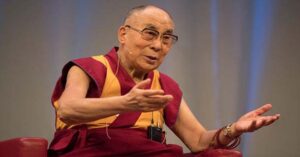The next Dalai Lama will be reincarnated on Chinese soil, says a Chinese spokesperson, and chosen by the Chinese government as per ancient customs — and if India endorses any other candidate, it would adversely impact bilateral ties between the two countries. Speaking to journalists in Lhasa recently, Zha Luo, director of government think tank China Tibetology Research Centre said that China would not recognise any Dalai Lama reincarnate born in exile in India or elsewhere as that is not the “traditional way”. “The Tibetan government in exile cannot choose a candidate to succeed the present Dalai Lama, said Zha Luo, and if India recognises such a candidate, it would affect Indo-Chinese ties. No wise leader would do such a thing’”.
Amidst concerns for the health of the 84 year old Dalai Lama, the issue of choosing his successor, considered both a spiritual as well as political figurehead by the Tibetan people, has put India in a tight spot. The 14th Dalai Lama has lived in exile in India since fleeing the Chinese authorities in 1959 – he, along with the thousands of Tibetans who followed him, were granted asylum by the Indian government. Speaking about his possible successor in the past, the Dalai Lama has hinted that he would be reincarnated in India or anywhere else in the world where there is free religious will, unlike in communist China. The Central Tibetan Administration has also sought India’s support on this sensitive issue, pointing out that the process of selecting the next Dalai Lama comes under the spiritual domain of Buddhism, and that the officially atheist Chinese government should not interfere in the matter.
Traditionally, after the death of a Dalai Lama, Buddhist leaders and teachers begin to look for visions and signs to find the reincarnated leader, and young candidates are put through various tests, like identifying the items that belonged to the previous Dalai Lama, among others. The process can take a long time; it took four years to identify the current Dalai Lama.
Chinese authorities however maintain that every Dalai Lama so far has been selected through two steps— drawing of his name from the golden urn at the Potala palace in Lhasa, and recognition of the candidate by the Chinese government. “The reincarnation of a Dalai Lama is a historical, religious and political issue with established traditions and procedures in place to locate him. The reincarnation cannot be decided by the Dalai Lama’s personal wish, or that of a group of people living in another country,” said Wang Neng Sheng, a Chinese government official.
This issue is also expected to put a strain on the already-precarious US-China ties, with the US taking a stand against state interference in a purely religious matter.
Chinese officials have also issued a statement warning India against changing the status quo in Arunachal Pradesh, which China claims is part of southern Tibet. While India has thus far maintained a quiet distance from the religious issue, it remains to be seen how it would react to the political threat to its borders.





 Print
Print Email
Email